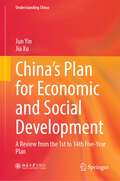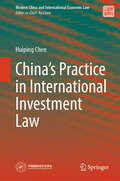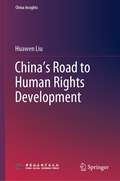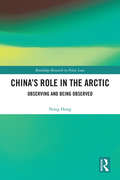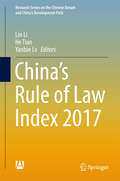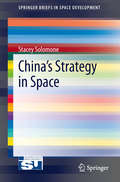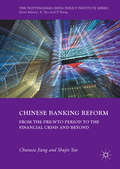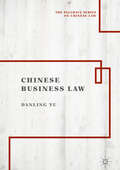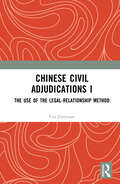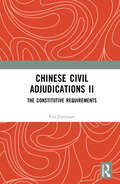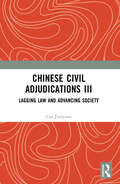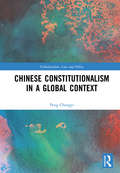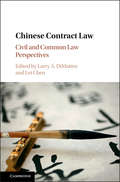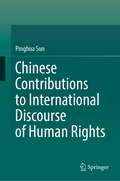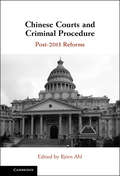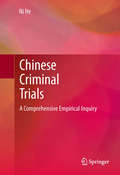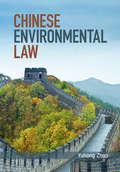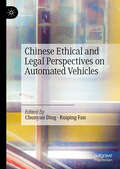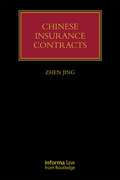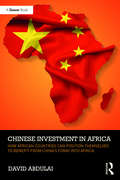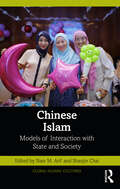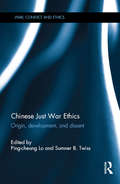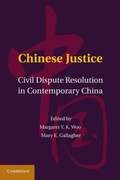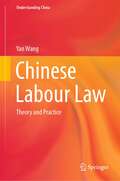- Table View
- List View
China’s Plan for Economic and Social Development: A Review from the 1st to 14th Five-Year Plan (Understanding China)
by Jun Yin Jia XuThis book reviews the basic process of China’s fourteen five-year plans with systematic theoretical overview and rich historical data and moves on to discuss the theoretical logic of plan-based state governance. The authors hold that the five-year planning system with Chinese characteristics is a flexible planning system; through adaptive macro-planning and incentive target governance, it mobilizes government, market and social forces to work together to fulfill national objectives and is a representative mechanism of the state governance system and a symbol of modernized state governance capacity. From an academic point of view, it theoretically answers questions about what, why and how concerning the five-year plans. From an interdisciplinary perspective, it explores the theoretical logic and experience of plan-based governance by combining Marxism, western theories, and the science of history. Also, it tries to represent historical facts based on a vast literature about the history of CPC and PRC, reviews historical details of the previous thirteen five-year plans, and describes the great journey of the plan preparation and implementation under the CPC leadership. This book has been published in Simplified Chinese (Peking University Press) and Traditional Chinese (Hong Kong Open Page Press). It has won the 2021 Annual Books of China Economics Education and Research Network, the first prize of excellent Works of the First Young Marxism Prize, 100 "Red Classic Reading" recommended reading books of Jiangsu National Reading Activity Leading Group celebrating the Centennial of the Founding of the Party, and Jintai Good Books of People's Daily Library.
China’s Practice in International Investment Law (Modern China and International Economic Law)
by Huiping ChenThis book covers China&’s practice in the past 20 years in four areas: China&’s practice in investment treaty conclusion, China&’s practice in the development of investment treaty, China&’s practice in the investment dispute settlement, and China&’s Belt and Road Initiative and international investment law. Being a major capital-import and export country, China has rich experience in international investment law including treaty conclusion and ISDS practice. China is also active in participating the currently undergoing ISDS reform. China&’s Belt and Road Initiative has implications for the development of international investment law. This book is good for graduates, researchers, governmental officials, and practitioners in investment law area.
China’s Road to Human Rights Development (China Insights)
by Huawen LiuThis book describes the development of human rights in the People's Republic of China since 1949. In particular, since the reform and opening-up, China has deepened its understanding of the rule of law and human rights, and realized the incorporation of human rights into the Constitution. The cause of human rights in China has entered a period of rapid development in a planned and step-by-step manner, and a path of human rights development suited to China's national conditions has been set out. China's international exchanges and cooperation in the field of human rights have gradually deepened and strengthened, and China has made unique contributions, becoming a participant, builder and contributor to international human rights governance.
China’s Role in the Arctic: Observing and Being Observed (Routledge Research in Polar Law)
by Nong HongThis book explores the growing interests of China in the Arctic and examines the nature of its interests and motivations in maintaining its involvement and presence in the region. The new geopolitical landscape of the Arctic today is a significant departure from the great power politics that existed in the region during the Cold War era. Apart from traditional Arctic states, more and more international organizations and non-Arctic states are showing an increased interest in this region, not least China. Many have attempted to interpret China’s intention in moving to the high north and this book aims to add to the existing literature from three approaches: China’s participation in the international institutions, China’s relationships with the Arctic stakeholders and China’s sectoral engagement in the Arctic. In taking a three-dimensional approach to the analysis, the author builds a comprehensive picture of China’s interests and activities in the Arctic, not only from the perspective of China but also from the viewpoint of other Arctic states (Russia, Canada, the U.S., Norway, Sweden, Denmark, Finland and Iceland). One of the first books in English to cover the subject since the release of China’s Arctic policy white paper in January 2018, this analysis will be of interest to academics, students of Arctic studies, maritime law and international law, as well as policy makers in Arctic and non-Arctic states.
China’s Rule of Law Index 2017 (Research Series on the Chinese Dream and China’s Development Path)
by Lin Li He Tian Yanbin LvThis book investigates and evaluates the indexes of Government Transparency, Judicial Transparency, Procuratorial Transparency, and Legislation by Local People’s Congresses in China. It explores a representative case study on the Rule of Law in Yuhang District of Hangzhou City, assesses the progress made and remaining problems in the implementation of these systems, and puts forward suggestions on how they could be improved in the future.
China’s Strategy in Space (SpringerBriefs in Space Development)
by Stacey SolomoneThis book addresses why China is going into space and provides up- to-date information on all aspects of the Chinese Space Program in terms of launch vehicles, launch sites and infrastructure, crew vehicles for space exploration, satellite applications and scientific exploration capabilities. Beyond mere capabilities, it is important to understand how Chinese aerospace leaders think, how they make decisions, and what their ultimate goal is during their space endeavors. What are Chinese intentions in space? To what extent does culture and ethics influence Chinese strategic decision-making within the highest levels of the aerospace industrial complex? This book examines these questions and offers four potential scenarios on where the Chinese space program is headed based on this new perspective of understanding China's space goals. This book is not only required reading for policy makers and military leaders in the US government, but also for the general population, students, and professionals interested in truly understanding the reasons behind what the Chinese are doing in space.
Chinese Banking Reform: From the Pre-WTO Period to the Financial Crisis and Beyond (The Nottingham China Policy Institute Series)
by Shujie Yao Chunxia JiangThis book is a wide-ranging and timely overview of the contemporary Chinese banking system. It charts the vast changes in Chinese banking from before China's admission to the WTO in 2001 to more recent regulatory reform and developments in the shadow banking sector. The book begins with an economic history of the mono-banking system, and a critical discussion of reforms taken by the government in preparation for China's entry to the WTO. The second part of the book discusses banking regulation and government policy during and after the global financial crisis in 2008-2009 and their impact on banking, including recent developments. Finally, the book concludes an empirical analysis of the impact of banking reforms on a number of important issues, including bank efficiency, capital structure, competition and financial stability, and risk taking behaviour, and a review of the relevance of shadow banking and internet banking.
Chinese Business Law (The Palgrave Series on Chinese Law)
by Danling YuThis book offers the first definitive English-language resource on Chinese business law. Written by an authoritative source, the book accurately describes what the business law is and explains legislative intentions underlying the myriad of law, rules, and regulations. Moreover, it provides the most up-to-date information on law, rules, and regulations and contains accurate predictions of the future legislative trend. It is written for readers across the spectrum of both common law and civil law systems. The author’s experience as expert counsel to Chinese central governmental legislative functions including the State Council Legislative Affairs Office and the expert editor and translator in chief of the national administrative regulations in business and finance, extensive experience of international legal practice and arbitration, and teaching and research experience in international business law and Chinese law will make this book of interest to lawyers, business people, and scholars.
Chinese Civil Adjudications I: The Use of the Legal-Relationship Method
by Cui JianyuanAs the first volume of a three-volume set that provides critical reviews of typical civil cases in China, this book focuses on the methodology of legal relations and their importance in adjudication.It is crucial to identify and determine the specific legal relationship that encompasses certain civil rights or obligations. This allows for the application of appropriate or analogous legal norms. By using these norms, along with the entire body of law or rule of law, it becomes possible to identify all the civil rights and obligations within that legal relationship and to understand their interrelationships. This leads to the proper handling of controversial cases. In the nine cases discussed in this volume, the method of legal relations was overlooked to varying degrees. Therefore, an important goal of this volume is to encourage both legal practice and theoretical research to take note of and implement the methodology of legal relations.The book will appeal to scholars and students interested in China's civil litigation, civil law system and judicial reform, and comparative law.
Chinese Civil Adjudications II: The Constitutive Requirements
by Cui JianyuanAs the second volume of a three-volume set that critically reviews typical civil cases in China, this book focuses on the importance of constitutive requirements of legal rules.A legal rule consists of constitutive requirements and legal effects. The constitutive requirements should trigger specific legal effects and not lead to unintended consequences. If they do not, the application of a legal rule may not produce the desired result. Any change in the constitutive requirements should result in a corresponding change in the legal effects. A mismatch between the two can lead to unfairness and injustice. In the nine cases discussed in this volume, these principles were either seriously overlooked or given insufficient attention, with various negative consequences.The book will appeal to scholars and students interested in China's civil litigation, civil law system and judicial reform, and comparative law.
Chinese Civil Adjudications III: Lagging Law and Advancing Society
by Cui JianyuanAs the final volume of a three-volume set that critically examines typical civil cases in China, this book focuses on resolving conflicts between outdated laws and an advancing society.Laws may become obsolete over time, or their relevance may be greatly diminished. With social changes and changes in the social system, it becomes inevitable to update laws. In China's reform and opening-up era, the social relations governed by civil and commercial laws are constantly evolving, resulting in noticeable changes. However, the enacted and effective civil and commercial laws may not immediately keep pace with these changes. Against this background, it may not always be appropriate to apply the law mechanically, especially in individual cases. Judgments in particular cases may be based on the details of those cases, guided by fundamental principles, and may disregard certain specific provisions in order to achieve fairness and justice. Some of the nine cases discussed in this volume have successfully practiced these principles, but most still have room for criticism and improvement.The book will appeal to scholars and students interested in China's civil litigation, civil law system and judicial reform, and comparative law.
Chinese Communists and Hong Kong Capitalists: 1937–1997
by Cindy Yik-yi ChuThis book examines Chinese Communist activities in Hong Kong from the outbreak of the Sino-Japanese War in 1937 to the handover in 1997. It reveals a peculiar part of Chinese Communist history, and traces six decades of astounding united front between the Chinese Communists and the Hong Kong tycoons and upper-class business elite.
Chinese Constitutionalism in a Global Context: A New Romance Of Three Kingdoms (Globalization: Law and Policy)
by Peng ChengyiOver the course of the last four decades as China’s ideological realm has been transformed, it has become significantly more complicated. This is well illustrated in the current discourse concerning China’s constitutional future. Among Chinese intellectuals the liberal constitutionalism paradigm is widely accepted. However, more recently, this perspective has been challenged by mainland New Confucians and Sinicized Marxists alike. The former advocate a constitutionalism that is based upon and loyal to the Confucian tradition; while the latter has sought to theorize the current Chinese constitutional order and reclaim its legitimacy. This book presents a discussion of these three approaches, analyzing their respective strengths and weaknesses, and looking to the likely outcome. The study provides a clear picture of the current ideological debates in China, while developing a platform for the three schools and their respective constituencies to engage in dialogue, pluralize the conceptions of constitutionalism in academia, and shed light on the political path of China in the 21st Century. The consequences of this Chinese contribution to the global constitutionalism debate are significant. Notions of the meaning of democratic organization, of the nature of the division of authority between administrative and political organs, of the nature and role of political citizenship, of the construction of rights are all implicated. It is argued that China’s constitutional system, when fully theorized and embedded within the global discourse might serve, as the German Basic Law did in its time, as a model for states seeking an alternative approach to the legitimate construction of state, political structures and institutions.
Chinese Contract Law: Civil and Common Law Perspectives
by Lei Chen Dimatteo Larry A.This book is the product of a unique collaboration between Mainland Chinese scholars and scholars from the civil, common, and mixed jurisdiction legal traditions. It begins by placing the current Chinese Contract Law (CCL) in the context of an evolutionary process accelerated during China's transition to a market economy. It is structured around the core areas of contract law, anticipatory repudiation (common law) and defense of security (German law); and remedies and damages, with a focus on the availability of specific performance in Chinese law. The book also offers a useful comparison between the CCL and the UNIDROIT Principles of International Commercial Contracts, as well as the Convention on Contracts for the International Sale of Goods. The analysis in the book is undertaken at two levels - practical application of the CCL and scholarly commentary.
Chinese Contributions to International Discourse of Human Rights
by Pinghua SunThis book discusses human rights law, focusing on Chinese contributions to international human rights viewed from a perspective of global governance. The original research presented here integrates a variety of research methods: inter-disciplinary approaches, historical and comparative methods, documentary research and so on. The research findings can be described briefly as follows: In global governance, the Universal Declaration of Human Rights (UDHR) serves as a historic cross-cultural heritage, while Pengchun Chang, the Chinese representative, made great contributions to the establishment of the international human rights system. After examining the characteristics of the Chinese discourse on human rights in global governance, the book suggests fundamental principles for improving human rights standards in China. In addition, it explores Chinese concepts of human dignity concerning the Declaration on Human Dignity for everyone, everywhere. The target readers are global scholars and students of law, politics, philosophy, international relations, human rights law, religion and culture. The book will provide these readers a vivid picture of China’s contributions to international human rights, and a better understanding of the significance of traditional Chinese culture and wisdom.
Chinese Courts and Criminal Procedure: Post-2013 Reforms
by Björn AhlContrary to the general perception of legal regression under Xi Jinping, this volume presents a more nuanced picture: It combines a wide range of analytical perspectives and themes in order to investigate questions that link institutional changes within the court system and legal environment with developments in criminal procedure law. The first part of the book investigates topics that contextualise institutional and procedural aspects of the law with a focus on various actors in the judiciary and other state and party organs. The second part of the book shifts the perspective to three controversial themes of criminal procedure reform: pre-trial custody review, live witness testimony in court and criminal reconciliation. By shedding light on performance evaluation of judges and interactions of courts and media the final part of the book introduces two sets of contextual factors relevant to the adjudication of criminal cases.
Chinese Criminal Trials: A Comprehensive Empirical Inquiry
by Ni HeThis book provides a unique empirical study of criminal trials in China. Western observers such as the media, politicians and the legal scholars alike, have rarely had the exposure to the vast majority of the ordinary criminal trials in China. A number of legal reforms have been implemented in Chinese criminal courts in recent years, but there has been little research on whether these reforms have been effective. This book fills that gap, by unveiling the day-to-day reality of criminal cases tried by the lowest level courts in China. The data used in this study include hundreds of criminal trial observations, complete criminal case dossiers, and a comprehensive questionnaire survey of criminal justice practitioners from one large province located in China's Southeast coast. These data were collected over a two-year period, with a generous research grant from the John D. and Catherine T. MacArthur Foundation, by scholars already working in the Chinese legal system. The work opens with a historical framework of the Chinese criminal justice system, both Western and Chinese interpretations, and an overview of the current state of the system. It will provide unique analysis of how criminal trials are being carried out in China, with a useful context for scholars with varying levels of familiarity with the current system. The research framework for gathering data discussed in this book will also provide a useful basis for studying the criminal justice system in other regions.
Chinese Environmental Law
by Yuhong ZhaoSince the economic take-off of the 1980s, China has undertaken industrialization and urbanization at unprecedented scale and speed. As it became the world's second largest economy, the burden of pollution has reached the limits of nature's carrying capacity. Chinese Environmental Law provides a comprehensive, structured and up-to-date analysis of the increasingly sophisticated Chinese environmental law regime. It examines the statutory regulation of pollution in detail, covering key environmental statutes, policies and plans, and investigates judicial innovation in the interpretation and application of environmental legal instruments. The book presents Chinese environmental law in action and in context. By discussing key institutions and processes, readers gain exposure to the operation of Chinese environmental law and the dynamic interactions among different institutions, both state organs and non-governmental organizations. The unique socio-economic and political context presents special challenges to the implementation and enforcement of environmental law in China.
Chinese Ethical and Legal Perspectives on Automated Vehicles
by Ruiping Fan Chunyan DingThis book explores the significance of automated vehicles from a Chinese perspective, bringing a wide range of scholarship to bear on the question. This project takes a deep dive into Chinese ethical and legal perspectives on automated vehicles, providing a valuable resource for the general public. It also prompts readers to compare and contrast Chinese and Western viewpoints regarding the use of automated vehicles as future transportation and their impact on human-machine relationships. By dedicating individual chapters to specific issues such as programming, safety, liability, privacy, and data protection, this book enables policymakers and general readers to gain a clear understanding of the societal implications of automated vehicles shaped by culture and law. Additionally, by including survey results from two representative Chinese cities with distinct cultural and legal backgrounds, it caters to the need for insights into general Chinese perspectives on the ethical and legal issues surrounding automated vehicles. This book will interest policymakers, technologists and scholars.
Chinese Insurance Contracts: Law and Practice (Lloyd's Insurance Law Library)
by Zhen JingChinese Insurance Contracts: Law and Practice is the first systematic text written in English on the law of insurance in China. This book offers a critical analysis of the major principles, doctrines and concepts of insurance contract law in China. At every point the analysis discusses the principles of the Insurance Law in detail, referring where appropriate to decided cases and also drawing attention to external influences. Readers are guided through the complexities of Chinese law in a clear and comprehensive fashion, and – significantly – in a manner that is accessible and meaningful for those used to a common law system. This book presents a comprehensive picture of Chinese insurance contract law, to facilitate a wider understanding of the relevant rules of law. Elements of insurance contract law are critically examined. In addition, this book presents rules of law on some special types of insurance contract, such as life insurance, property insurance, liability insurance, motor vehicle insurance, reinsurance, and marine insurance. The deficiencies and shortcomings of the law and practice will be identified and analysed; suggestions and recommendations on how to reform the law will be presented. Chinese Insurance Contracts also offers legal and practical advice to insurance professionals on how to draft clauses to avoid contractual pitfalls. It also uses cases to illustrate the difficulties which can arise in applying the principles in practice. This book will be essential reading for insurance companies and legal practitioners looking to do business in China, as well as reference for Chinese lawyers practising insurance law. It will also be a useful resource for students and academics studying Chinese law.
Chinese Investment in Africa: How African Countries Can Position Themselves to Benefit from China’s Foray into Africa
by David N. AbdulaiChina leads the world when it comes to investment and influence on the African continent. The extent of Chinese investment in Africa is well known and much has been written about China’s foray into Africa. However, most of the available material has approached this issue by looking at China as the ’New Colonialist’ – more interested in Africa’s vast natural resources than working in partnership for sustained development. Whilst China’s interest in Africa’s resources is evident, it is just half of the story. China’s foray into Africa goes beyond its appetite for natural resources and into the realm of geo-politics and international political economics. For example, China is all too aware of how it can cultivate Africa’s support on global issues at the United Nations and at other international fora. Breaking free from the binary arguments and analysis which characterize this topic, Professor Abdulai presents a refreshing perspective that China’s foray into Africa can produce win–win outcomes for China and Africa – if Africans really know what they want from China. Hitherto, each African country has tended to engage China with an individual bucket list; acting in isolation and not as part of a wider continent (indeed Africa and the African Union does not yet have a coordinated policy towards China). For Africa to be able to do that it needs to know where China is coming from, the factors that contributed to its awakening and success, and the benefits and possible pitfalls of this foray, in order to better position itself for a win–win engagement with China. This book will be a valuable read for policy makers, think-tanks and students of Africa-China studies programmes alike.
Chinese Islam: Models of Interaction with State and Society (Global Islamic Cultures)
by Nasr M. Arif Shaojin ChaiThis book explores the fascinating and complex histories of Islam and China. Meticulously researched and captivating, it provides a comprehensive history of the encounters and relationship between these two great civilizations, as well as the unique development and indigenization of Islam within China.The work looks at the early interactions between Arab Muslim traders and the Tang dynasty in the seventh century, shedding light on the establishment of the first Muslim communities in China. The narrative then progresses through subsequent dynasties, examining the ebbs and flows of Muslim influence, integration, and indigenization. It looks at the emergence of the Hui and other Muslim ethnic groups, who play a central role in the story of Chinese Islam. By delving into their customs, beliefs, and distinctive practices, the authors unveil the intricate process of indigenization, where Islam becomes deeply rooted in Chinese culture and society. One of the unique features of this collection is the nuanced analysis of the impact of major political events, as well as gradual social changes, on the process of adoption and transmission of Islam in China. The authors also highlight the role of economic activities, Chinese Islamic scholars, and key architectural landmarks in this multifaceted history.Part of the Global Islamic Cultures series that looks at integrated and indigenized Islam, this book will be of interest to students and researchers of religion, Islamic studies, religious history, political Islam, cultural studies, Islamic law, and Asian studies. It will also be useful to readers who are interested in world religions, theology, and cultures.
Chinese Just War Ethics: Origin, Development, and Dissent (War, Conflict and Ethics)
by Ping-Cheung Lo Sumner B TwissThis book offers the first comprehensive analysis of warfare ethics in early China as well as its subsequent development. Chinese attitudes toward war are rich and nuanced, ranging across amoral realism, defensive just war, humanitarian intervention, and mournful skepticism. Covering the five major intellectual traditions in the "golden age" of Chinese civilization: Confucian, Daoist, Mohist, Legalist, and Military Strategy schools, the book’s chapters immerse readers in the proper historical contexts, examine the moral concerns in the classical texts on their own terms, reframe those concerns in contemporary ethical idioms, and forge a critical dialogue between the past and the present. The volume develops fresh moral interpretations of classical texts such as The Art of War, Mencius, Xunzi, Mozi, and the Daodejing and discusses famous philosophers such as Han Fei and Wang Yang-ming, representing antithetical schools of thought about warfare. Attention is also given to the military ethics of the People’s Liberation Army, examining its thinking against the backdrop of its own civilizational context. This book will be of much interest to students of just war theory, Chinese politics, ethics, and philosophy, military studies, and International Relations in general.
Chinese Justice
by Mary E. Gallagher Margaret Y. WooThis volume analyzes whether China's thirty years of legal reform have taken root in Chinese society by examining how ordinary citizens are using the legal system in contemporary China. It is an interdisciplinary look at law in action and at legal institutions from the bottom up, that is, beginning with those at the ground level that are using and working in the legal system. It explores the emergent Chinese conception of justice - one that seeks to balance Chinese tradition, socialist legacies and the needs of the global market. Given the political dimension of dispute resolution in creating, settling and changing social norms, this volume contributes to a greater understanding of political and social change in China today and of the process of legal reform generally.
Chinese Labour Law: Theory and Practice (Understanding China)
by Yan WangThis book provides an overall understanding of Chinese labour law and covers many important issues related to the application of Chinese labour law. Particularly, the book explains the difficult points in Chinese labour law from the perspective of juridical practice. Many typical cases are selected to illustrate the important issues in Chinese labour law. These cases are from the courts in the developed areas in China, where foreign-funded enterprises gather. Also, the book addresses the implications of the Civil Code on the labour law. The latest developments are reflected in the book, which include guidelines related to labour dispute case hearing formulated by the Higher Courts in many provinces, and the guiding cases released by the Supreme Court. Such developments are the reflections of fragmented judicial application of Chinese labour law.
